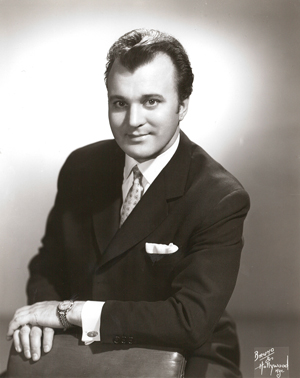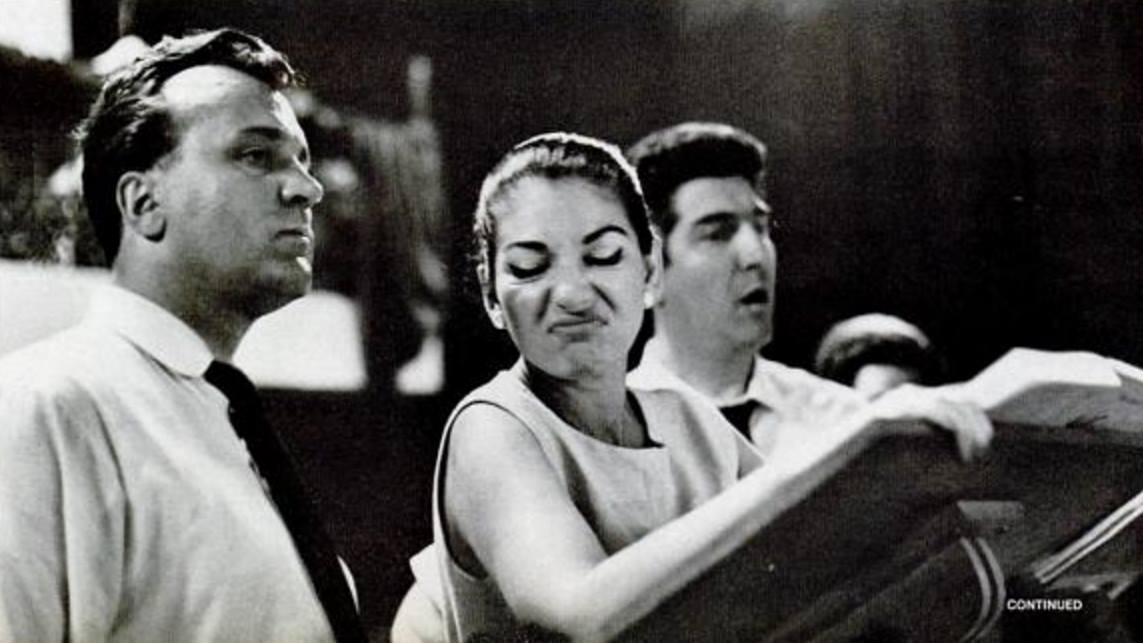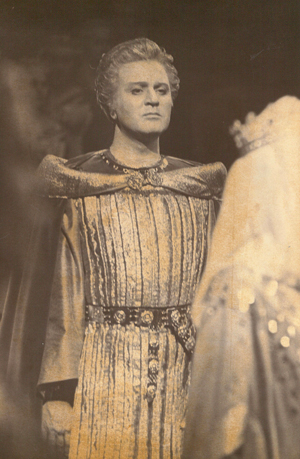 Giuseppe Verdi |
SATURDEE OPRY
LINKS |
 Giacomo Puccini |
 Giuseppe Verdi |
SATURDEE OPRY
LINKS |
 Giacomo Puccini |
|
Saturdee Opry Links # 103: Gedda Special 2
Saturdee
Opry Links' big tribute to Nicolai Gedda is here, for your flagrant
disregard and enthusiastic ambivalence. One of the greatest tenors, he rose
from a terrible upbringing to become fluent in about six languages, sing in
every genre and style, and tap dance naked whenever the moon was new. (Just
testing to see if you are reading. That's actually me, not Gedda.) Overture!
Ten carefully agonized-over selections! Two encores! And the second encore
even has the word, "encore," in the title! I know, I know, you are shrinking
away, knowing full well it is all too good for you, and while I appreciate
your humility, it really is not necessary. Just think of opera as a
different sort of kick in the pants than you might be used to:
Saturdee Opry Links Overture!
The astonishing prelude to "Tannhauser," by Wagner. https://www.youtube.com/watch?v=nW5lTeA5xDM 
 
Nicolai Gedda
Rehearsing with Callas. Maybe it was something she ate.
As Lohengrin, 1966
1.
Bright and brisk, as per the weather today, here is "Vainement, ma bien-aimee," from Edouard Lalo’s "Le roi d’Ys," as sung by the incomparable tenor, Nicolai Gedda. Is it heroic? Is it charming? Is it "merely" lyrical? This, the most frequently recorded selection from the lesser-known opera, finds Mylio, a young warrior, trying to convince Rozenn, his bride-to-be, to leave the protection of her handmaidens (who, in accordance with local custom, refuse to allow him entrance to her living quarters) and join him in the wedding procession. In other words: "Let's get this thing over with, baby!" (Note: the aria is preceded by a short introductory recitativ of about one minute.) https://www.youtube.com/watch?v=0QjzVZ80EHs Translation: RECITATIVE: Since these jealous guardians will not be moved to mercy, ah, let me tell you of my anguish and my torment! ARIA: In vain, my beloved, do I seem to despair: next to your closed door I am determined to stay! Suns may be extinguished, nights replace days, but without blaming you and without complaining, I shall stay here for ever! I know that you have a kind heart, and the hour will soon come when the hand which now pushes me away will reach out towards mine! Do not delay too long in allowing yourself to be won over by your tender feelings; If Rozenn does not appear soon soon, I, alas, shall die!
2.
Part of Nicolai Gedda's
NYT 2017 obit reads,
"The fluid lightness of
Mr. Gedda’s voice made
him especially well
suited to the French
repertoire." True
enough, as is well
exemplified by the
gorgeous, almost
ethereal "dream" aria
from Massenet's 1882
opera, "Manon." Often
referred to as "Le Rêve"
("The Dream"), this is
the lovely "En fermant
les yeux," or "When I
close my eyes." No one
floats it like Gedda
did.
Setting: Apartment of
Chevalier Des Grieux,
Paris, France, 18th
century
Synopsis: In order to
cheer Manon up, Des
Grieux relates to her a
dream that he has had.
He has dreamed that
someday he will own a
house surrounded by
beautiful flowers and
singing birds. However,
he realizes that his
dream was still drear
because it lacks one
thing : Manon.
Translation:
3.
Nicolai Gedda had one hell of a troubled upbringing in his native Sweden. The illegitimate child of a teenaged waitress, he was abandoned at birth, only to be retrieved from authorities six days later by his biological father's older sister. Deciding to raise the boy, she married a Russian-born singer, Michail Ustinoff---but Swedish authorities deemed the couple too poor to adopt. Hence Gedda was illegitimate twice over! And home life was distinctly lacking a Ward Cleaver: at the slightest perceived infraction (Gedda wrote in his autobiography), his foster father would beat him into tears with “a narrow Cossack belt that had once belonged to his uniform.” It perhaps was a relief to Gedda when he learned that these were not his actual parents, while in his late teens. Yet Ustinoff also did the boy some good, seeing to it that he became fluent in Russian and Swedish--- and later German, when Ustinoff became the choirmaster of a Russian Orthodox Church in Leipzig. Most significant, Ustinoff secured voice lessons for the child, who was singing and playing piano like a champ by age. . .five! In 1934, after the rise of Hitler, the family returned to Stockholm, where Gedda grew up, sleeping in a tiny alcove off the kitchen of their tiny apartment. A dull life as a bank clerk was thwarted when a customer introduced the young man to one Carl Martin Ohman, who had been a mentor of the renowned Swedish tenor, Jussi Björling. What a break! And so began Gedda's formal training, first with Ohman, later at the Royal College of Music in Stockholm. Young Nick was quickly propelled to the operatic fore, making his debut at 26 as the coachman, Chapelou, in the comic opera, “Le Postillon de Lonjumeau,” by the French composer Adolphe Adam (with the Royal Swedish Opera.) His performance---notably the aria “Mes amis, écoutez l’histoire,” with its crazy high D (the highest commonly sung note for tenors)--- brought the house down. The rest is melody. Here is that effervescent aria, recorded years later, at the peak of Gedda's international success. Prepare to lose socks at that high D. https://www.youtube.com/watch?v=DT62kj7TZIQ Translation: https://en.wikipedia.org/wiki/Mes_amis,_%C3%A9coutez_l%27histoire Gedda's NYT obit: https://www.nytimes.com/2017/02/10/arts/music/nicolai-gedda-celebrated-opera-tenor-dies-at-91.html
4.
Gedda sang everything, and I mean
everything: from ethereal Faure to
whimsical Debussy, from heavy
Richard Strauss to light Johann
Strauss, from Poulenc to Bach to
Auber to Puccini to Wagner to Irish
folk songs, and much more. French
repertory, Italian repertory,
Russian repertory, German
repertory---there was nothing he
could not sing, and sing superbly.
He was especially celebrated for the
role of the poet, Lenksy (a distant
relative), in Tchaikovsky's Eugene
Onegin, but not to worry, I won't
subject you to such melancholia
today. He was a kind of tenorial
superman, with 367 appearances at
the Metropolitan Opera alone, still
singing with excellence well into
his seventies. Plus he had one hell
of a bitchen widow's peak!
Here is the great Gedda with the
emotional and musical roller coaster
that is the beautiful, compelling
"Ella mi fu rapita" from Verdi's "Rigoletto."
Synopsis:
The notorious, womanizing Duke of
Mantua discovers that his latest
conquest, Gilda, has been kidnapped.
Apparently smitten with the
realization that he might actually
love this woman, the Duke sings of
his despair and anguish that someone
has taken his "beloved" away.
Translation:
5.
A friend very generously
sent me a huge boxed set
of Nicolai Gedda
recordings, and it is
one of those things
that, once you start
hearing, you don't want
to stop. Well, at least
I don't. He was a lyric
tenor---one of the best
"light and bright"
Mozart tenors ever---yet
could also command great
emotional power in
Italian grand opera,
steely nobility in
Wagner, and understated
purity in Bach. Amazing,
really. After Mario
Lanza, who my
grandmother used listen
to when I was knee-high
to a Nehi bottle, Gedda
was the first operatic
tenor I ever heard. My
old man used to wear out
a copy of "Highlights
from 'La Boheme'"
starring Gedda and
Mirella Freni, which
sounded to my
ten-year-old psyche
mostly like a lot of
very upset people. It
took many listens, most
uncomprehending, before
the beauty and poetry
sunk in. Here is Gedda's
rendition of the
greatest of love arias,
"Che Gelida Manina,"
from "Boheme." "Son un
poeta. . .che cosa
faccio? Scrivo! E come
vivo? Vivo!" ("I'm a
poet. What do I do? I
write! And how do I
live? I live!") No
wonder I came to
identify with Rodolfo,
the perpetually broke
freelance writer and
poet. When I grew a
goatee in my twenties,
my much-amused father
took to referring to me
as "Rodolfo." Har.
https://www.youtube.com/watch?v=5POBhayH8W4 Setting: Christmas Eve in a room in an attic Synopsis: After both of their candles go out, Rodolfo and a young woman who has come to his room in order to relight her candle are in the darkness together. Pretending to look for her key which she had lost in the room, Rodolfo instead finds her hand and sings to her of his dreams and ambitions. He also tells her that he has fallen in love with her. Translation: http://www.aria-database.com/search.php?individualAria=36 AND here is the tremendous studio recording of the aria that much perplexed my fledgling kid-brain. . . https://www.youtube.com/watch?v=pLUrcyFcuhY
6.
Having a little trouble Gedda-ing a grip this a.m., but am staunchly persevering. Seeing as St. Nicolai has served SOL well, here at the start of the hollandaise season, might as well make it an all-Gedda affair. Here is a selection that I present with apologies to operatic appreciator novices who might prefer selected arias. It is part of a scene from Act 3 of "La Boheme," a short excerpt that is so alive, so graceful with gorgeous, natural, interweaving and complementary melodies, it's as if Puccini could not NOT write beauty here. I've been listening to it almost all my life, and in almost every instance, the geese bump. (Even better: the full act.) So here is that little bit of "Boheme," with Gedda (Rodolfo) Mirella Freni (Mimi), Mariella Adani (Musetta), Mario Sereni (Marcello.) https://www.youtube.com/watch?v=W9zR8FDU36Y To follow along, here is the libretto: (Search for "Dunque e" and start there.) http://www.murashev.com/opera/La_boh%C3%A8me_libretto_Italian_English For those who are still curious, here is most of the entire Act 3, with English subtitles. Keep handkerchief handy. Luciano Pavarotti, Fiamma Izzo d'Amico, Roberto Servile, Madelyn Renée Monti. https://www.youtube.com/watch?v=2KyOpIVJYII
7.
Young Gedda
once
auditioned
for one
Walter Legge,
a classical
record
producer at
EMI. After
the
audition,
Legge
immediately
sent
telegrams to
legendary
conductor
Herbert von
Karajan, and
to Antonio
Ghiringhelli,
who oversaw
La Scala.
Legge did
not mince
words: “Just
heard the
greatest
Mozart
singer in my
life. His
name is
Nicolai
Gedda.”
(Yes, this
gave Nicolai
a Legge up!)
Understand,
please, that
many a fine
singer has
vocal gifts
that force
specialization
in genre or
period.
There are
many, for
example, who
sing
primarily
Mozart and
music of
that era,
because of
their
lighter,
lyric voices
(the type
that best
fit Mozart
operas.)
Gedda was
one of those
who
transcended
genre. Here
is an
example of
the tenor at
his Mozart
best, "Dalla
sua Pace,"
from "Don
Giovanni."
"On her
peace of
mind depends
mine, too."
Setting: The
countryside
near the
palace of
Don Giovanni
Synopsis:
After Donna
Anna asks
Don Ottavio,
her fiance,
to take
revenge of
Don Giovanni
for killing
her father,
she leaves,
at which
point Don
Ottavio
express his
love and
worry for
her.
https://www.youtube.com/watch?v=lCyyL-o_YxI
Translation:
8.
Told you
Gedda sang
Irish songs.
Here is the
heartbreaking,
"Down By the
Salley
Gardens,"
set by
Benjamin
Britten.
What? A
heartbreaking
Irish song?
Whoever
heard of
such a
thing?
Words:
9.
But back to bright and brisk, where we started. Got to program one or two chestnuts in every SOL, right? Here are Nicolai Gedda and glamorous Anna Moffo, raising a glass, as Alfredo and Violetta always do, in Verdi's "La Traviata." Follow the bouncing ball. "Let us drink from goblets of joy!"
Setting: A late-night party at the house of Violetta Valery
Synopsis: Alfredo is convinced by Gastone and Violetta to show off his voice. He sings (as this title suggests) a drinking song.
Translation:
FINAL BOW:
The SOL tribute to Nicolai Gedda will end where it started, in French repertory---with a tremendous reading of the heroic "Ah, fuyez douce image," from "Manon," by Massenet. "Ah! Vanish sweet memory too dear to my heart!" Now there's a sentiment with which we all can identify, I expect.
Setting: The reception room in St. Sulpice church, France, 18th century
Synopsis: After entering the seminary in order to forget about Manon, Des Grieux finds that he is unable to forget his love for her. He prays to God to remove this shadow from his heart.
Saturdee Opry Links Encore!
For those who found the Nicolai Gedda "final bow" a bit too close to home. . .Mi cantar hecho de fantasia. . .
Translation:
Saturdee Opry Links Second Encore!
Gedda on stage in Moscow at age 55. Singing that haunting, eerie aria from Bizet's "Pearl Fishers," as only he could. https://www.youtube.com/watch?v=0rjD2CLut-0 Synopsis : In the past, Nadir had fallen in love with a beautiful Brahman priestess named Léďla at a Brahman temple. Now, a veiled priestess has come to his village and he recognizes her as Léďla. He sings of his love for her which has not been diminished by the time they have spent apart. Translation: https://www.opera-arias.com/bizet/les-pecheurs-de-perles/je-crois-entendre-encore/
|